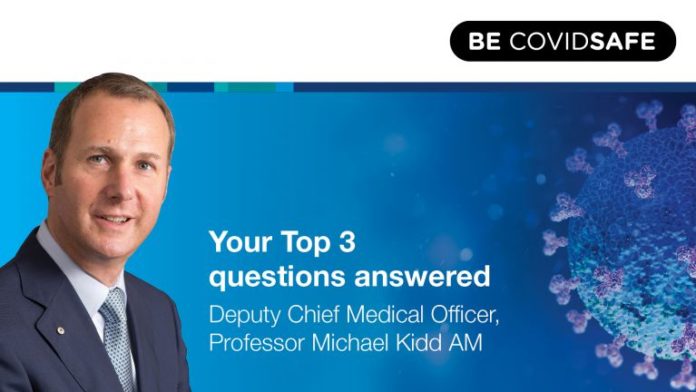Australia’s Acting Chief Medical Officer, Professor Michael Kidd answers the top 3 questions you’ve been asking about the COVID-19 vaccine:
Question 1: If I’m over the age of 50 why is it safe for me to get the AstraZeneca vaccine?
Professor Kidd: The Australian Technical Advisory Group on Immunisation, ATAGI, has looked at this and has made the recommendation that people over the age of 50 are safe to continue to receive the AstraZeneca vaccine.
The majority of cases of Thrombosis with Thrombocytopenia Syndrome have been seen in people under the age of 50.
What we also know is that the risk of serious disease and death from COVID-19 increases very significantly as people become older. So the risk is far greater for people over the age of 50 and particularly the people over 70, over 80, and over 90.
So, that’s why the Australian Technical Advisory Group on Immunisation is recommending that people over the age of 50 can still safely receive the COVID-19 vaccine from AstraZeneca.
Question 2: If I’m under the age of 50 and have already received the first dose of AstraZeneca, should I get the second dose?
Professor Kidd: So it’s a great question – the answer is yes. The Australian Technical Advisory Group on Immunisation, the group we call ATAGI, these are the experts, the medical experts, in vaccination in our country, have recommended that people who’ve received a first dose of the AstraZeneca vaccine and who haven’t experienced serious side effects from that first dose are safe to receive the second dose of the AstraZeneca vaccine.
This is based on the experience of the AstraZeneca vaccine rollout in other countries around the world particularly in the UK and in Europe where millions and millions of doses of the AstraZeneca vaccine have been used.
This advice of course has come out following concerns about a new condition called Thrombosis with Thrombocytopenia Syndrome or TTS which has emerged in a very small number of people who’ve received the AstraZeneca vaccine.
We’ve had a couple of confirmed cases in Australia, and a number of cases which have been reported, in the United Kingdom, and in a number of countries in Europe. This syndrome appears to affect about four to six people per million who are injected with the AstraZeneca vaccine. It’s very important to put this in context though, because although this may affect four to six people per million who get the vaccine, what we know is that one to two people per hundred who are infected with COVID-19 will sadly die as a result of COVID-19 infection.
It’s also very important the ATAGI guidance is that people under the age of 50 should receive the Pfizer vaccine as the preferred vaccine over the AstraZeneca vaccine and that recommendation came out a week ago today.
It’s also important to recognise that there are side effects from all the COVID-19 vaccines. Some people will experience very mild side effects, this may include pain or redness or swelling at the site of the vaccine and also some people in the day or two after the vaccine may develop fever or chills or headache or aches and pains or generalised tiredness. These are common symptoms after many vaccines. The Thrombosis with Thrombocytopenia Syndrome occurs between four to 20 days after the vaccine and is much more serious symptoms. People develop very severe headache or severe abdominal pain and of course if that occurs people should seek urgent medical advice.
Question 3: What is the vaccine consent form and do I need to complete one before I get a COVID-19 vaccine?
Professor Kidd: So, it’s very important that people provide consent before receiving any vaccine. This consent can either be verbal, so you can be asked by your doctor or the nurse who’s giving you the vaccine whether you consent to receive the vaccine and then that will be documented in your medical record.
Or you may be asked to complete a consent form where you go through a number of questions and you then provide your consent and say, ‘yes I’m happy to receive the vaccine today’.
The Australian Government Department of Health has produced a consent form on health.gov.au, this has been updated over the last week to include information about the AstraZeneca vaccine and the very small risks of the Thrombosis with Thrombocytopenia Syndrome.
Your doctor or your nurse may ask you to complete the Australian Government consent form or the practice may have their own consent form, which they ask you to complete. But as I say it’s important that we consent, to receiving any vaccine and that that consent is documented.


